And after a decade long-boom in house prices, the past 12 months have been a real turning point. Real house prices have already fallen 13%, and last month Rightmove reported a £6,000 decline in average asking prices. But some commentators believe the worst is still to come due to higher interest rates and a struggling economy. In 2008, house prices fell 20% in a short time, but so far, nominal house price falls have been more modest. We shall look at what the experts forecast for house prices in 2024, but first, why are housing transactions drying up and will this translate into lower prices?
Downward pressure on House Prices
1. Overvaluation
Since 2010, UK house prices rose nearly 90%. Yet, this was at a time of weak economic growth and almost stagnant real wages. A period of ultra-low interest rates combined with quantitative easing caused a boom in asset prices, which was good for homeowners but increasingly pushed house prices out of the reach of new buyers. The ratio of house price to incomes rose to over nine times income.
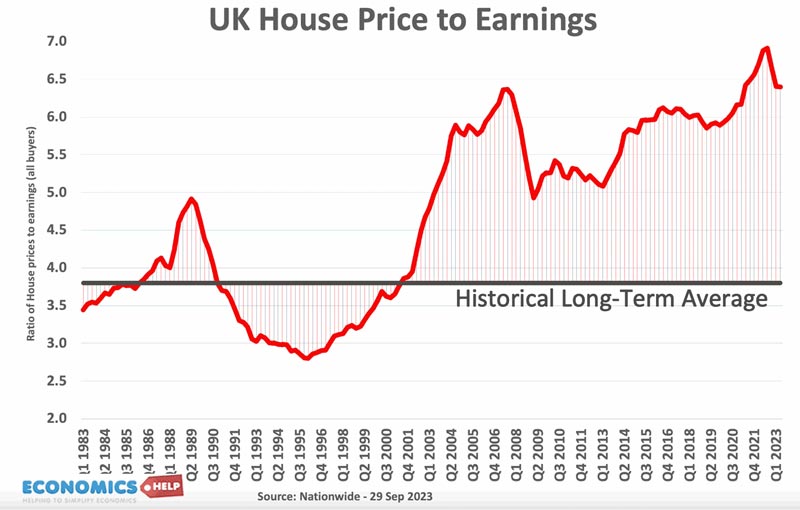
The Nationwide measure shows house prices reached historical levels of overvaluation. Schroders stated house prices are the highest multiple of income since the Victorian era. And in the past year, there has only been a tentative revaluation with studies suggesting prices have not caught up with the new circumstances.
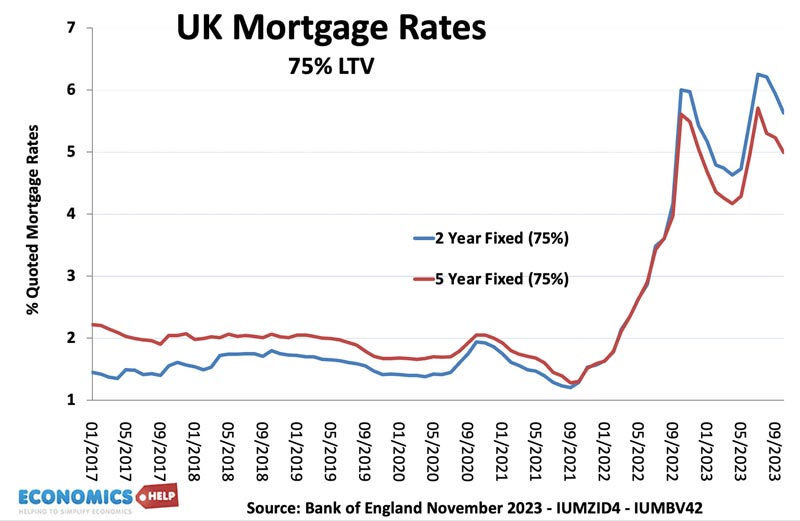
2. Rising interest rates
On top of these record prices, rising interest rates were like a double whammy. The cost of mortgages soared. In 2020, with mortgage rates at 2%, a household paying £1,000 a month mortgage could borrow £235,930. But, with mortgage rates settling around 5%, the same household could only borrow £171,060. Higher wages reduce this effect a little, but basically buying power is much diminished, and this is reflected in falling demand.
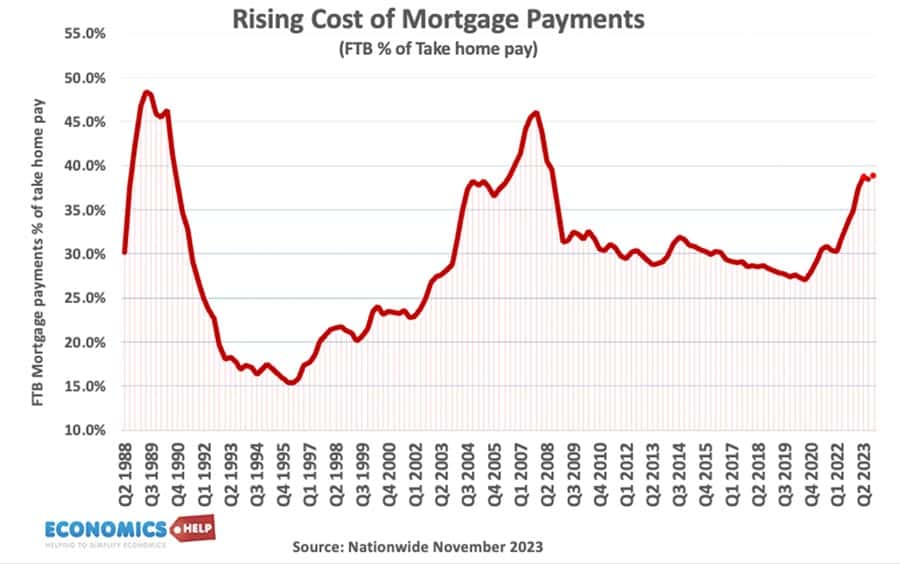
For first time buyers mortgage payments as a share of income rose from 27% to 37%, and this is at a time of cost-living pressures, which have reduced disposable incomes – especially for the younger generations struggling with higher taxes, student loans and rampant rent inflation. Though it is worth noting that payments as a share of income is not as bad as 1991 and 2008.
In recent months interest rates have narrowly fallen since the mid summer peaks, when inflation was appearing more stubborn than expected. However, it is a mistake to think that the impact of interest rates will fall away. Firstly, many homeowners have been insulated by past rises through being on fixed rate deals. In 2008, variable mortgages were common, but in recent years, 2 and 5 year fixed have become the most common type of mortgage.
As these expire in the next few months, homeowners will face a sharp jump in repayments, which could be as much as £500 a month. The Bank of England recently stated that two thirds of the decline in demand from past rate rises will happen in the future. There’s a lot of bad news to come. As rates continue to rise, it will cause a rise in mortgage arrears.
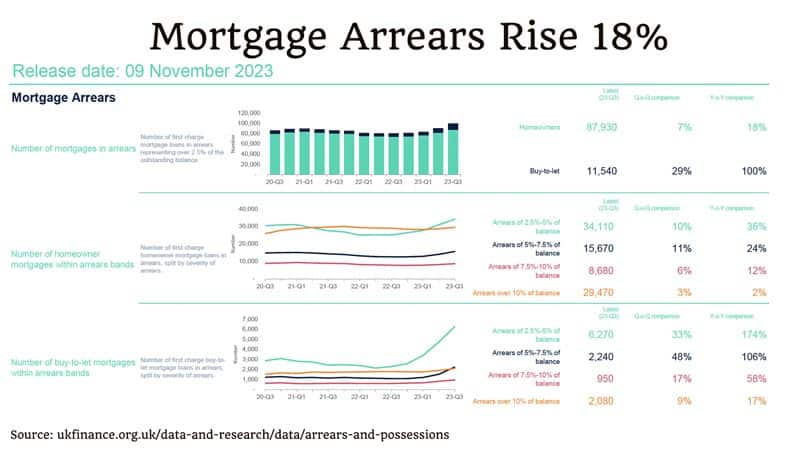
Already these have risen 18% in the past year. Combined with stagnant wages and a weak economy, this will force more to sell in 2024. As the supply of homes on the market rise, it will cause more downward pressure on prices. We have seen also private buy to let landlords sell up, pushed out by higher rates and new regulations. During Covid, we saw fewer houses put on the market, and this helped to prop up prices. But, in recent months, more homeowners are trying to sell.
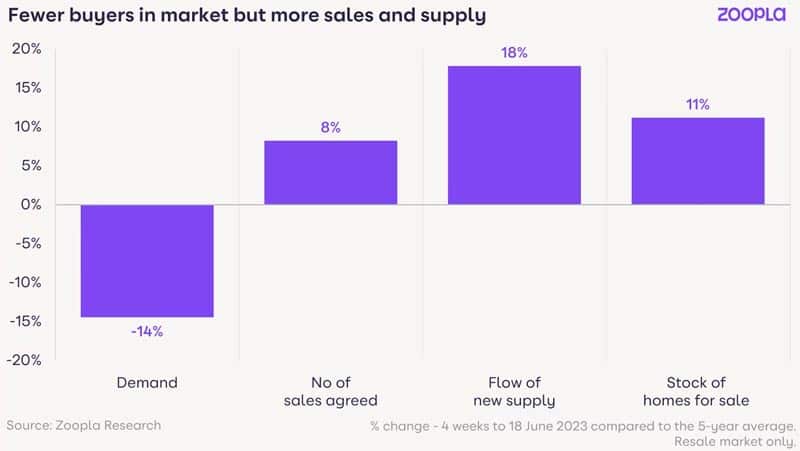
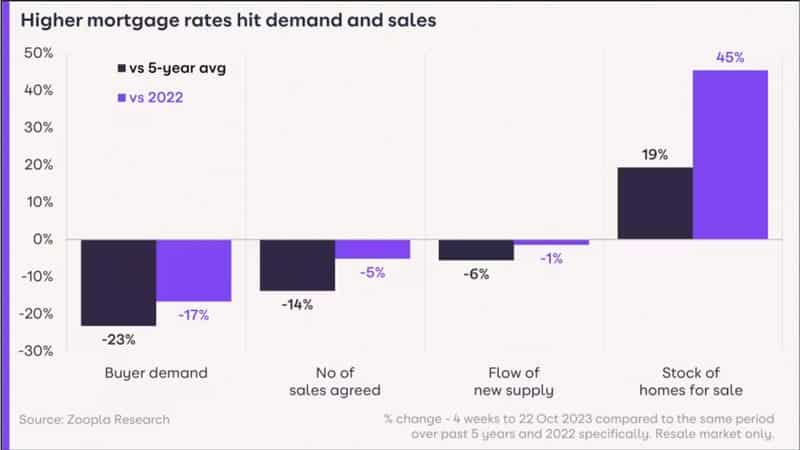
This increase the number of properties in the market and will be key for pushing prices down in 2024.
Falling transactions and buyer demand
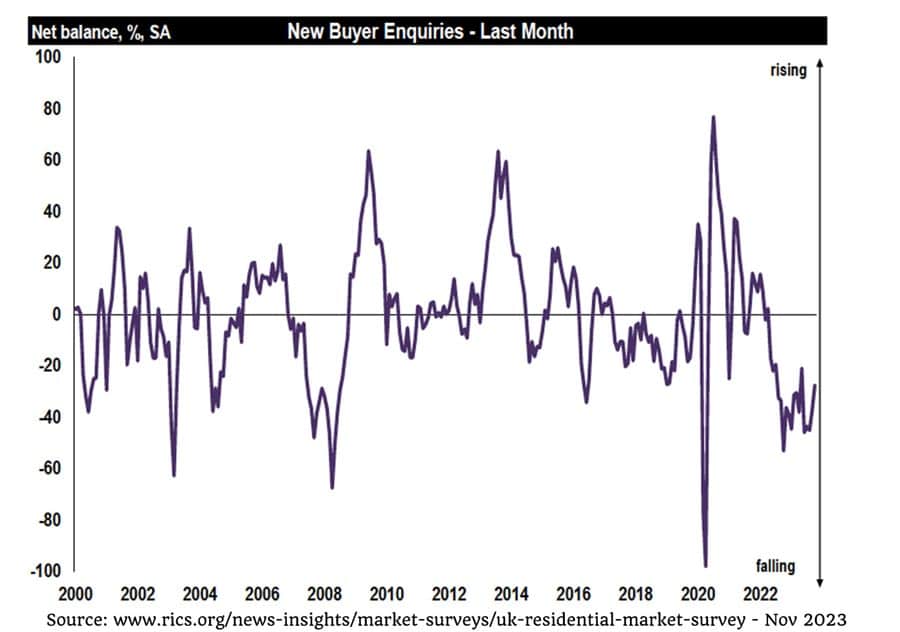
For much of 2023, we have seen a stand-off between buyers and sellers, this is why transactions have fallen so much. But, the recent report of a £6,000 drop in asking prices is a sign of things to come as frustrated sellers, realise they have to price more realistically. The housing market is never straightforward, because there are numerous time lags. It takes time for higher rates to impact the market, and when it does, it takes time for sellers to reluctantly reduce asking prices. Even if interest rates were to be marginally cut in 2024, there would still be a depressing effect from past higher rates.
Government policy
In recent years, the market has also been inflated by government policies such as help to buy. A government scheme which attempted to solve the over-valued house prices by enabling first-time buyers to borrow even more. It was great for home builders like Persimmon and Barratt who saw share prices triple in this period. This helped accelerate the rise in demand and stretch affordability even more. Even the House of Lords claimed the £29bn help-to-buy scheme merely inflated house prices and provided bad value for the taxpayer. It would have been better to invest in social housing where there is a real shortage. The end of help to buy is quite significant as it will further reduce demand, just at a time when it is most vulnerable.
The impact of interest rates is bigger
The final point is that some say, interest rates of 5% are nothing. And it is true in 1992, interest rates of 15% caused a 20% fall in house prices, and a price decline which lasted over 4 years, causing the price-to-income ratio to fall below 3. But, given the high price of houses, interest rates of 6%, have an equivalent effect to 13% 20 years ago. The key thing is to see how much monthly mortgage payments have risen.
UK economy woes
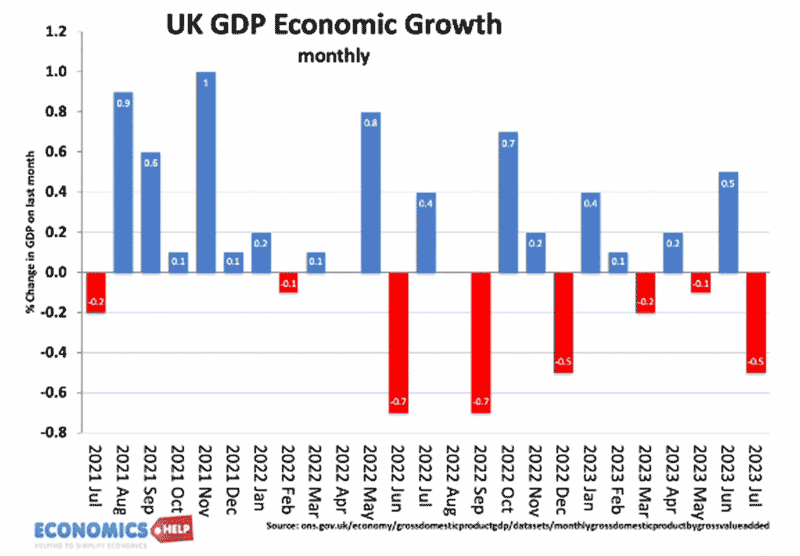
On top of the housing market woes, there is another key factor to consider, and that is the state of the UK economy. Technically we avoided a recession in 2023, but growth has been very stop/start. Real wage growth since 2016 has been minimal, The tax burden has risen to a post-war high and households are left with high debt levels, low savings and retail sales are falling under this pressure. In this climate it is challenging to raise a deposit – average deposits have grown to over £50,000 and according to the Resolution Foundation, it takes an average of 14 years to save for one. If the economy deteriorates, with rising unemployment, this would be devastating for the housing market, reducing demand and pushing people to sell.
Higher returns on non-housing assets
The final factor which may affect the housing market is markets are still adjusting to end of the zero interest rate cycle. As interest rates rise, bonds become relatively more attractive than assets like housing, which are giving a relatively poor rate of return, compared to the security of buying in bonds. It is another factor that makes buy to let unattractive – why take on hassle of being a landlord when you can get a similar rate of return from buying bonds?
Factors limiting house price falls
You could say this is the case for falling house prices. But, if prices have only fallen 3-4% given 14 consecutive interest rates – is it not the case that so called experts, have been exaggerating the prospect of a fall in house prices? And it is true, the housing market is different to say 2008, with some factors limiting price falls.
Inflation reducing overvaluation
The first factor is that we have had high inflation in the past three years. Nominal wages have risen 17% in the past two years. This means that rising nominal wages are increasing nominal buying power. This is why the fall in real prices is much greater than nominal prices. If we deflate house prices using RPI, there has been a really big fall in real prices.
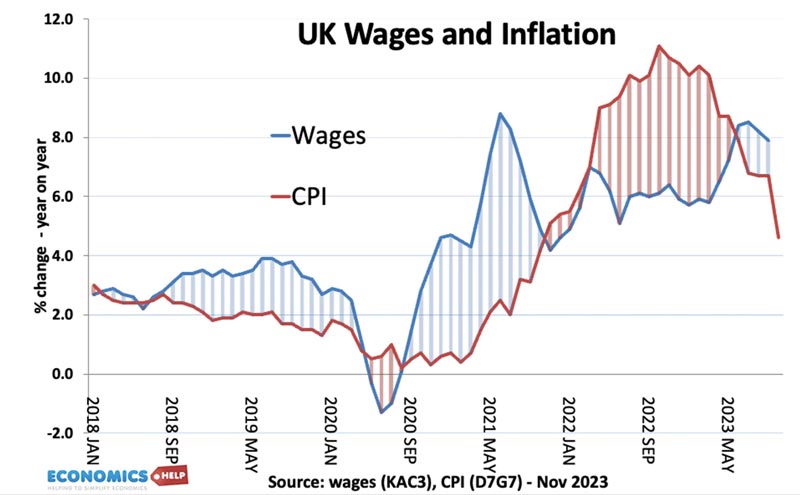
Last month, the ONS reported nominal wages rising at 8%, yet inflation has started to fall to 4%. This is good news for both the economy and the housing market – we are seeing both rising real wages and positive real interest rates – a rarity in the UK in recent years. But, there are two caveats – firstly it is highly unlikely nominal wage growth will remain elevated. The fall in inflation was widely expected due to falling energy prices. But, if we look deeper, services inflation is still running at over 6% – which gives a guide to underlying inflation better than headline rate.
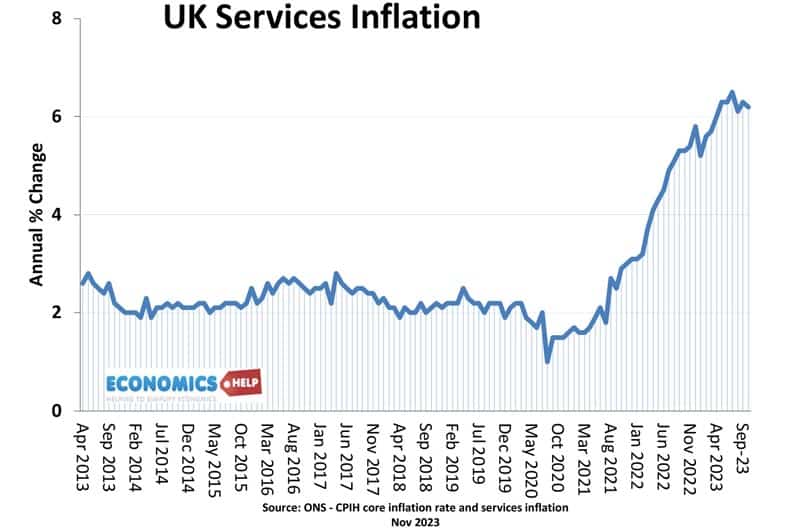
There are forecasts that interest rates may be cut as early as May. In March I took out a variable mortgage rather than a fixed rate mortgage because I was optimistic or perhaps a better word is hopeful that rates wouldn’t stay high. But, a minor fall in interest rates would not necessarily cause prices to rise. Don’t forget there are long-time lags, we still haven’t felt the impact of past rate rises. But the Bank of England report by end of 2024, inflation could fall below the inflation target of 2%. If we head towards deflation, it is very unlikely interest rates will remain anywhere close to 5%.
Economy
However, it is important to remember it is not just interest rates that affect house prices, equally as important, if not more so is real wages. If some external shock tipped the UK economy into recession, this would be additional downward pressure on prices, no matter what happened to interest rates.
Supply
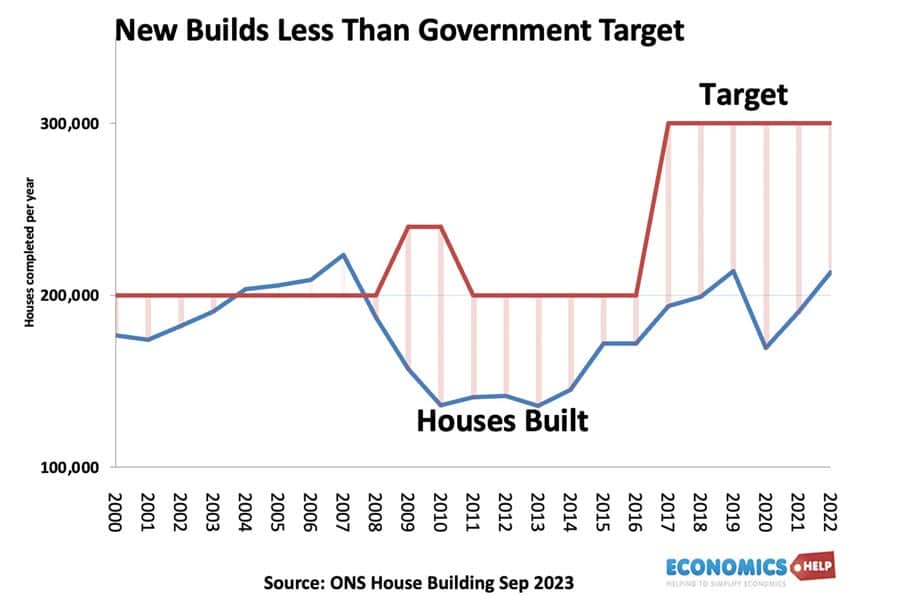
Another factor with regard to the housing market is the issue of supply or more accurately the lack of supply. The UK has a rising population, partly caused by net migration. Yet, the UK frequently, if not always, fails to meet government targets for house building. The relative lack of supply is often put forward as a reason for high house prices. And it is true to some extent, if the UK had built half a million houses a year for the past decade there would be more downward pressure on prices now. But, it is a mistake to think supply shortages, will always prevent house price falls. As a rough rule of thumb, one government study suggests if we built 1.5 million houses, prices would be around 8% lower than otherwise. In the short-term at least, prices are driven by changes in demand.
Personal ancedotes and regional effects
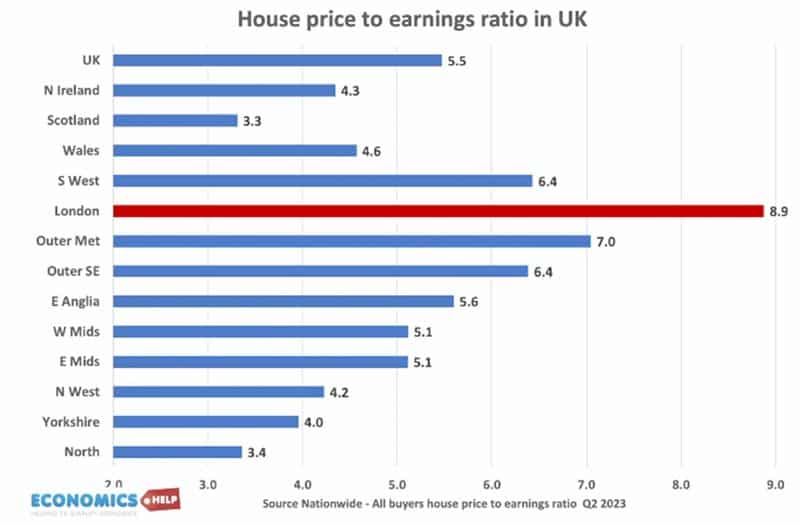
Now, at this point, in any discussion on the housing market, people often want to chime in with their own anecdotes and experiences. The overvaluation of prices varies enormously by region – and house price falls are likely to be concentrated in the south – areas where higher rates are biting hardest. But, even this is inadequate as even in the same towns, some houses may sell quite well. But, others struggle. Feel free to leave a comment on what you are noticing in your area.
How accurate is house price data?
Another complication for the housing market at the moment is uncertainty about how accurate housing market data is. It is not an exact science, but each use there own methodologies. If fewer houses are sold, it becomes harder to come up with a national index. Nationwide index relies on mortgage lending, but this has fallen sharply. If relatively more expensive houses are sold, then this may inflate the average selling price/mortgage. The ONS measure uses figures from the land registry, but there is often a considerable time lag. So the price changes reflect more what was happening 6-12 months ago. How can you predict prices when we don’t know what is happening right now? At the very least be wary of monthly changes and use annual measures.
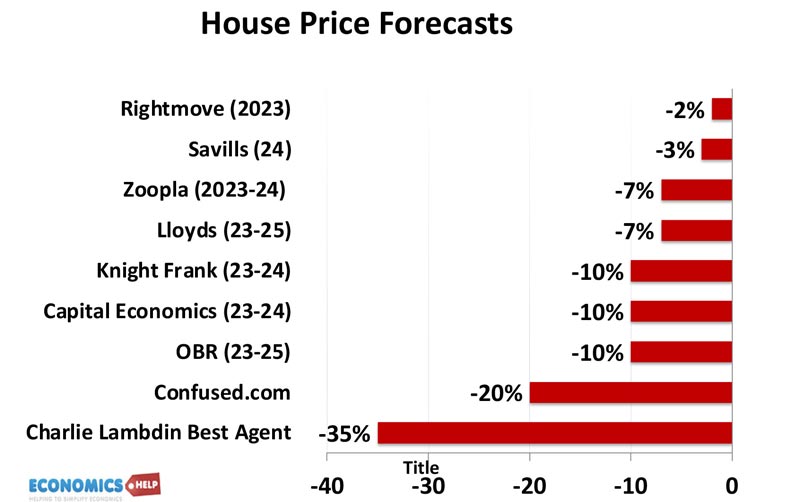
So what are the experts predicting for house prices? There is a large variation all the way from virtually no change to drops of 35% peak to trough. It is worth bearing in mind, that 1990s housing collapse lasted 4-5 years – price corrections can take a long time. Going back to the first graph, why did prices fall so rapidly in 2008 but not 2023? It was the global credit crunch and recession. Banks virtually stopped lending. At the moment, we don’t have anything like this. There has been better regulation since 2008, with less sub-prime mortgages and banks stress testing at higher mortgage rates. Although arrears have risen, they are nothing like the mass repossessions we saw in the early 1990s
So where does that leave us for 2024? The average consensus of forecast suggests continuing falls in prices, but there is unlikely to be anything dramatic. A steady decline. The big unknown is the state of the economy. There is always risk of unexpected event, such as surge in oil prices like 2022, which could cause renewed inflation and pressure for higher rates, or if the impact of higher rates and higher taxes increasingly bites, the UK could slip into recession. But, on the other hand, the bank predicted a recession last year and with inflation now falling quickly, this will help boost real wages and catch up with the lost earnings of past years. I tend to the more pessimistic of the house price falls, I once said 15% nominal fall peak to trough. But, it is clear that high inflation and rising nominal wages are doing a lot of the work of improving affordability. The house price to income ratio will fall, but will it be enough to return to post-war levels of affordability? Unfortunately, I’m not convinced. But, if you wait a couple of years, there is good chance of better affordability, but don’t make the mistake of waiting two years for 30% nominal falls which are very unlikely to materialise. If you are interested in the past housing crashes and the lessons we can learn for today, this video goes into how bubbles burst. And if you found this video useful please give thumbs up and do subscribe.
Sources:
https://builtplace.com/
https://www.rics.org/news-insights/market-surveys/uk-residential-market-survey
https://www.nationwidehousepriceindex.co.uk/
https://www.ukfinance.org.uk/data-and-research/data/household-finance-review
https://landlordknowledge.co.uk/house-prices-expected-to-fall-50k-by-the-end-of-2024/
https://www.zoopla.co.uk/discover/property-news/whats-going-to-happen-to-the-uk-housing-market-in-2024/
https://www.nomuraconnects.com/focused-thinking-posts/how-far-could-uk-house-prices-fall/
https://www.savills.co.uk/insight-and-opinion/savills-news/353744-0/uk-s-housing-market-is-past–peak-pain-
https://www.bankofengland.co.uk/monetary-policy-report/2023/november-2023
https://www.zoopla.co.uk/discover/property-news/whats-happening-with-house-prices-in-the-uk/
https://landlordknowledge.co.uk/house-prices-expected-to-fall-50k-by-the-end-of-2024/
https://www.savills.co.uk/insight-and-opinion/research-consultancy/residential-market-forecasts.aspx
